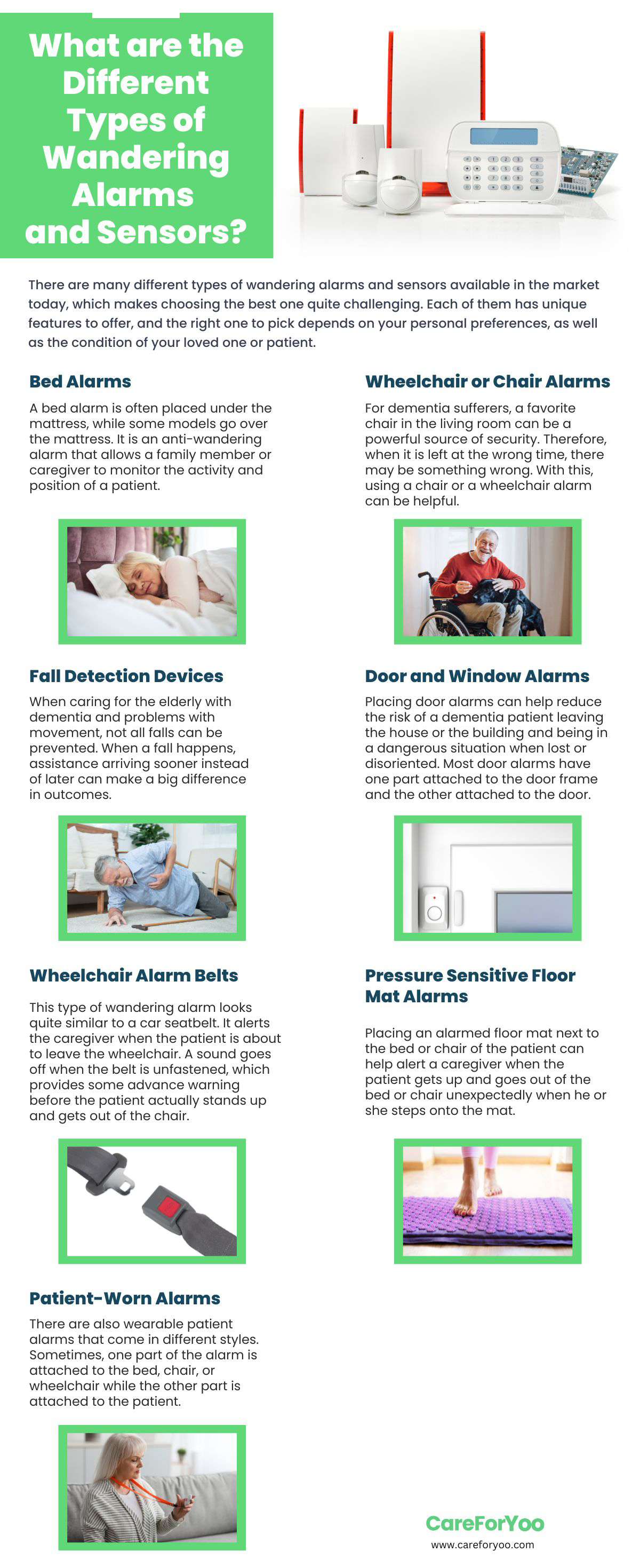One of the biggest concerns of caregivers of people with dementia is how to prevent wandering. It’s the risk associated with many conditions like dementia, which can result from Alzheimer’s disease, stroke, head injuries, and Parkinson’s disease.
Six out of 10 people with dementia will wander, according to the Alzheimer’s Association. You may not think that your senior parent can do it, especially if they are frail and slow-moving, but it still happens! The scary thing is that older adults who wander away are hard to find, as they themselves may not know where they are and where they are going. This is why it’s so important to keep your elderly parent safe.
However, no one can watch them every second of every day. Even the best and most dedicated caregiver may not be able to stop them from wandering every time. But through this article, learned why patients with dementia are prone to wander and how to deal with this problem.
Why Do Patients with Dementia Tend to Wander
Wandering is typical behavior among people with dementia, such as Alzheimer’s disease, and it can be dangerous if they wander outside or into unsafe areas. Memory loss is a hallmark symptom of Alzheimer’s disease, and it can cause a person to forget where they are or how to get back home, leading to wandering. Here are some of the reasons why they wander:
1. Disorientation and confusion
People with Alzheimer’s disease can become disoriented and confused, which can cause them to wander in search of familiar people, places, or things. When they are confused and disoriented, they may want to escape the situation, but as they depart, they may forget what happened and become unexpectedly lost, so they will tend to wander. Emotional distress can cause wandering.
2. Restlessness and boredom
When a person with dementia is bored, they would be looking for something to do, which can prompt a person to wander in search of stimulation or activity.
3. Anxiety and agitation
Being in unfamiliar or crowded locations may lead to stress and agitation for them, which can cause them to wander in an attempt to relieve their distress.
4. Frustration
Their inability to communicate can lead to frustration, so when a person with dementia can’t remember or ask for the things they need, they are more likely to try to do it by themselves.
5. Overstimulation
Loud noises and quick movements can cause a person with dementia to be anxious. The changes in their brain can cause them to interpret these stimuli differently than an average person might.
6. Attempting former responsibilities and chores
Sometimes, people with dementia cognitively revert to the times of the past, so they may feel responsible for doing things they used to do before. Responsibilities like cooking dinner for the family, gardening, or caring for a child can make them wander. If they are trying to go to the grocery store, get more seeds, or find their young child (who has already grown up), they may place themselves in unfamiliar environments where they can get lost.
7. Following past routes
As they sometimes go back to the past, they may try to follow familiar routes. They may try to follow the route to work, go on long walks, or return to an old neighborhood, but it can result in disorientation. Sometimes, even a simple trip to the kitchen or bathroom can lead to confusion, especially if the dementia is in the later stages.
8. Poor visual and spatial perception
In the late stages of dementia, a patient may have difficulty navigating a familiar space or understanding the layout of rooms, so they can get lost and tend to wander. Even their perception of dimension can be distorted, as they can get confused with two-dimensional and three-dimensional pictures and objects. For instance, a pattern of an area rug may come across as something that physically blocks their path, forcing a senior to navigate around it and confusing themselves.
9. Side effects of medication
Some medications used to treat Alzheimer’s disease and related symptoms can cause side effects such as confusion, dizziness, and disorientation, which can increase the risk of wandering.
Ways to Prevent a Person with Dementia from Wandering
Wandering may happen to anyone with dementia who is mobile, whether they can still walk or use a wheelchair. You cannot fully restrict your loved one from wandering, but there are things you can do so it would be less likely to happen.
Supervise the patient
In the early stages of dementia, it may be fine for them to be alone for short periods, but as dementia progresses, continuous supervision might be necessary. Always stay with them in new or changing environments, like stores, restaurants, and parks. If you’re the primary caregiver, consider getting hired help for running your errands, babysitting, or doing chores. But as the disease progresses, you may find it challenging to handle your elderly parent, and you may need the help of a professional caregiver.
Secure the home environment
Make it difficult for a person with dementia to get outside the house without anyone knowing. A simple solution would be to install bells on the door knobs so you can hear when someone tries to get out the door. But since it may be hard to keep track if it’s the elderly patient who’s going out (especially if other family members also live in the house), it’s best to secure the house by installing locks new locks on doors on windows that they can’t open easily. If you put it high up, your loved one is less likely to reach or notice them. You may also need to install bars on windows.
Besides these things, here are some more safety modifications you can do:
- Install child-proof door knob covers and child-proof covers on outlets, and cabinets with hazardous content
- Fence the yard or use a hedge to block the line of sight
- Install sliding bolts above eye level
- Use pressure-sensitive alarm mats on their bed to alert you if they get up at night
- Install alarms and motion-sensing devices
- Hide car keys, their purse, or wallet if they usually don’t leave the house without these things
Use alarms
Speaking of alarms, it can help if you increase security by adding the right wandering alarms and sensors. Consider what works well for your home.
Camouflage the doors that lead outside
One way to discourage an elderly with dementia from opening doors that lead outside is to camouflage them. You can install a curtain rod above the door and hang a curtain or a wall hanging over the door. Slide the curtain open and close it as needed, making sure the older adult doesn’t see you do it.
You can also add big signs like “Stop” or “Do not enter.” Another effective technique is to place a large, black doormat on the front door – some will think of it as a whole, and this would discourage them from actually going through the door.
Label or mark interior doors
When they are trying the doors leading outside, your elderly parent could actually be looking for an interior room, like their bedroom or the bathroom. Make sure these rooms are more accessible for them to find by adding some large signs or pictures on the doors.
Create a safe and familiar environment
Ensure that the person with Alzheimer’s disease has a comfortable and familiar environment that reduces confusion and disorientation. Avoid rearranging furniture or decor frequently as it can cause anxiety and confusion. Reduce the clutter but don’t make it overly unstimulating that they may want to go outside because the indoors is too boring.
Label and remind them of things to limit their disorientation in familiar settings. You can put signs on the doors or hallways, like “To the bathroom” with an arrow, so they can see which hallway leads where, and they won’t accidentally wind up outside.
If your house or your parent’s house is not conducive to living for a senior with dementia, you may consider other senior housing options for them.
Discover and solve triggers for wandering behavior
Another thing you can do is to identify the causes of wandering and shut it down so they won’t want to go somewhere anymore. Take notes of when it happens and what they were doing or saying just before. Over time, you might discover a pattern, like wandering around the same time every day, when they’re looking for the bathroom, when they’re hungry, or when they’re bored.
If boredom is causing them to wander, find meaningful activities to do to keep them engaged. Encourage a visit to the toilet or get them a snack or drink before that time of the day. Plan meaningful activities for them, as the more engaged they are, the less likely they are to wander. If they are bored throughout the day, they are more likely to become restless at night, so provide opportunities for them to exercise and be mentally stimulated.
Some people try to return to old routines like going to the office in the morning and picking up a child from school in the afternoon. To reduce this need and prevent the elderly from wandering, tell them some reassuring fibs to take their mind off what they want to do. For instance, if they feel the need to dress up and drive because they need to go to work, ask them if it’s a holiday and their office isn’t open. If they say they will pick up a child from school, tell them that child has a playdate at a friend’s house, and the friend’s mom promised to drop them off later. After that, disrupt the elderly with a snack or a favorite activity to take their mind off it. Think creatively and reassure them that everything is fine and they don’t have to do anything about it.
Increase their physical activity
If your elderly parent with dementia is still mobile, you may encourage them to exercise. Find something fun and easy workout to do on YouTube and do it with them. Even a supervised walk around the block before dinner might be enough to cut down their agitation. This way, they will more likely stay at home to rest rather than go outside.
Establish a regular routine
Establish a consistent daily routine that includes regular meals, activities, and sleep times. As much as possible, create a typical “normal day” for them, as this can help reduce restlessness and anxiety, which in turn, will reduce the likelihood of wandering.
Know your neighbors
You must get acquainted with your neighbor and introduce your loved one to them. Let the neighbors know the face and the name of your loved one with dementia, and tell them that this person may wander and that they should let you know if they see them out alone. Give every member of your neighbor’s household your number so they can reach you.
Be prepared
You must always be prepared in case your older adult wanders and gets lost. Here’s what you can do:
- Take a photo of them every morning, so you’ll always have an up-to-date photo of what they were wearing that day in case you need to show it to the police or rescue personnel.
- Sew or iron on small ID labels with contact information on their clothes.
- Dress them up in bright clothes to make it easy to see them from a distance.
Conclusion
There are many reasons why a patient with dementia tends to wander, and no one wants that to happen as it threatens their safety and security. It’s essential to monitor the person with dementia disease closely and to adapt the strategies as needed to prevent wandering. It’s best to combat their wandering behavior by knowing what causes it, so it can be prevented. It’s also advisable to take extra security measures for your home to keep them from going outside, but also, be prepared in case they do walk outside to wander.





